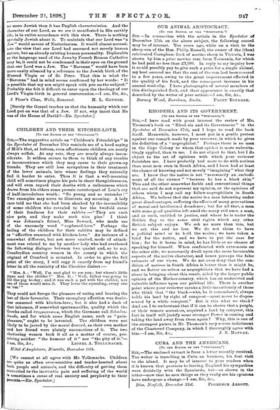CHILDREN AND THEIR KITCHEN-LOVE.
[TO TEE EDITOR OF THE "SPECTATOR."]
Sin,—The suggestive article on "Children's Friendships" in the Spectator of December 10th reminds me of a hard saying
of Mill's that, at bottom, even affectionate children are nearly always selfish. At any rate, they are nearly always incon- siderate. It seldom occurs to them to think of any trouble or inconvenience which they may cause to their grown-up friends. They are still lees scrupulous in their treatment of the lower animals, into whose feelings they naturally find it harder to enter. Thus it is that a well-meaning child will sometimes plague his pets in sheer thoughtlessness, and will even regard their deaths with a callousness which draws from his elders some prosaic counterpart of Lear's cry of half-incredulous wrath : "So young and so nntender !" Two examples may serve to illustrate my meaning. A lady once told me that she bad been shocked by the insensibility of some children who revealed to her the twofold cause
of their fondness for their rabbits :—" They are such nice pets, and they make such nice pies." I think
it was Johnson's friend, Miss Seward, who made use of the uncomely word "cupboard-love." Perhaps the feeling of the children for their rabbits may be defined
as"affection seasoned with kitchen-love." An instance of a somewhat different, but not more exalted, mode of attach-
ment was related to me by another lady who had overheard the following dialogue between two quaint and, so to es,y, Oranfordian country women in the county in which the original of Cranford is situated. In order to give the full point of the story, I will copy it exactly from my friend's letter in all the rusticity of the Cheshire dialect :—
"Mrs. L: 'Well, I'm reet glad to see you ; but where's little Anne and the childer r Mrs. B.: Well, father was going to kill the pig to-day ; and it was such a pet with the childer, not one of them would miss it. They loves the squealing, every one on 'em.'" They could not forego the pleasure of seeing and hearing the last of their favourite. Their exemplary affection was doubt- less seasoned with kitchen-love ; but it also had a dash of that inhuman, if somewhat sportsmanlike, quality which the Greeks called lartzatpsxxxsa, which the Germans call Schaden-
Nude, and for which some English name, such as " pain- pleasure; ought to be invented. The children were not likely to be jarred by the moral discord, as their own mother and her friend were plainly unconscious of it. The two chattering women took it all as a matter of course, per- 'editing neither "the humour of it" nor "tie pity of it"—
[We cannot at all agree with Mr. Tollemache. Children See quite as often over-sensitive and tender-hearted about
both people and animals, and the difficulty of getting them reconciled to the inevitable pain and suffering of the world la sometimes a cause of real anxiety and perplexity to their
ixtretta—En. Speetator.f






































 Previous page
Previous page